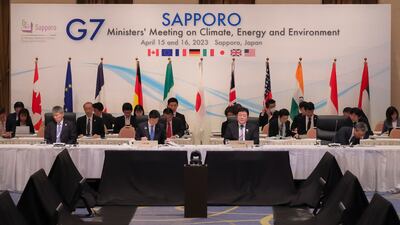Leaders of the Group of Seven advanced economies have reached a deal to accelerate the phasing out of fossil fuels and speed up the development of renewable energy, but fell short of agreeing on a timetable to stop using coal.
The G7 will “accelerate the phase-out of unabated fossil fuels so as to achieve net zero in energy systems by 2050,” Bloomberg reported on Sunday, citing a communique by the group’s energy and environment ministers.
Government officials assembled in Sapporo, a city in northern Japan, to discuss climate change, energy and environmental policies at a two-day meeting.
Russia’s war in Ukraine has disrupted global energy markets and intensified calls for a faster transition to clean energy.
A record 295 gigawatts of renewable energy capacity was added around the world last year, up nearly 10 per cent from the year before, according to the International Renewable Energy Agency.
More than 80 per cent of all new capacity last year was produced by renewables, the Abu Dhabi-based agency said in its Renewable Capacity Statistics 2023 report last month.
The G7 aims to increase solar capacity to more than 1,000 gigawatts and offshore wind generation to 150 gigawatts from 2021 levels across its constituents by the end of 2030, according to the communique.
Investing in natural gas could also help in resolving potential market shortages resulting from the Ukraine war, but only if such investments are consistent with climate goals and do not create long-term dependence, the group said.
On Saturday, Dr Sultan Al Jaber, Minister of Industry and Advanced Technology, and President-designate of the Cop28 summit, called on G7 nations to lead by example and make climate finance more accessible and affordable, to speed up the energy transition.
Addressing the joint meeting of G7 ministers of climate, energy and the environment, he said the world was falling behind on its climate commitments.
“To get where we need to go, everyone must pull in the same direction,” said Dr Al Jaber.
“We must replace polarisation with partnership, division with determination. That is why I am calling for a Cop of action, a Cop of unity, a Cop of solidarity and a Cop for all.
“We must act together to ignite a transformational agenda that is pro-growth, pro-climate and leaves no one behind.”
Global carbon dioxide emissions rose by less than 1 per cent last year as the growth of renewable energy and electric vehicles helped offset a surge in crude oil and coal consumption, according to the International Energy Agency.
Carbon dioxide emissions grew by 0.9 per cent last year to reach a new high of more than 36.8 billion tonnes, the agency said in its CO2 Emissions report last month.
Meanwhile, the global energy industry’s methane emissions surged to 135 million tonnes last year, slightly below 2019’s record highs.
Methane is responsible for about a third of global temperature increases since the Industrial Revolution. It dissipates faster than carbon dioxide but is a much more powerful greenhouse gas during its short lifespan.

